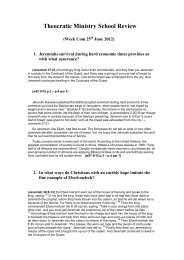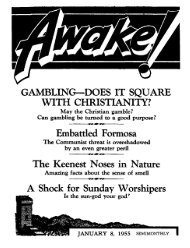1964 Awake! - Theocratic Collector.com
1964 Awake! - Theocratic Collector.com
1964 Awake! - Theocratic Collector.com
You also want an ePaper? Increase the reach of your titles
YUMPU automatically turns print PDFs into web optimized ePapers that Google loves.
Whereas other kings were deified after<br />
death, "it remained for Rameses to associate<br />
himself during his lifetime with such<br />
leading deities as Ptah, Ammon, and Horus,<br />
and to claim equally with them the<br />
religious regards of his subjects." (Ancient<br />
Egypt, by Rawlinson, Vol. II, page 318)<br />
On Cleopatra's Needle such a claim is often<br />
repeated. Listen to one extract regarding<br />
himself: "The son of Ra, born of the gods,<br />
holding his dominions with power, victory,<br />
glory; the bull of princes, king of kings,<br />
lord of the two cOWltries ... "<br />
Of interest to the Christian student is<br />
the frequent appearance of the crux ansata<br />
or ankh, the early form of a cross<br />
with a loop or handle. As a hieroglyphic<br />
character it stood for the word "life," portraying<br />
the <strong>com</strong>bined male and female sex<br />
organs from which the life of a new generation<br />
issues. Cross adoration stems from<br />
the ancient phallic worship of Babylon and<br />
early Egypt. With such a sordid background<br />
it has no connection with Christ's<br />
death, as <strong>com</strong>monly held in Christendom.<br />
(See The Two Babylons, by A. Hislop,<br />
pages 197-201; What Has Religion Done<br />
for Mankind?, published by the Watchtower<br />
Society, page 110.)<br />
Another interesting symbol that frequently<br />
occurs is the scarab beetle, representing<br />
resurrection and future life. The<br />
beetle's habit of burying its eggs in the<br />
sand, from which life later reappeared, and<br />
its dependence on the sun's warmth to incubate<br />
its eggs, tied in with their belief<br />
that the sun-gods were the source of present<br />
life and future immortality.<br />
What It Means to Us Today<br />
A visit to view this monwnent on London's<br />
Embankment or the corresponding<br />
one in New York's Central Park reminds<br />
one, then, of some of the religious beliefs<br />
of ancient Egypt, such as the multitude of<br />
gods and goddesses and trinities of gods,<br />
18<br />
the adoration given to the sun and other<br />
natural objects and the unclean practices<br />
associated with such worship. Besides this<br />
we can get some conception of the conditions<br />
in which the Israelites slaved under<br />
their Egyptian taskmasters, laboring in the<br />
construction of the cities and other structures<br />
designed to praise men and their<br />
gods. We glimpse too the atmosphere in<br />
which Moses lived as a young man when<br />
being "instructed in all the wisdom of the<br />
Egyptians" (Acts 7:22), and the type of<br />
ruler that Moses and Aaron faced with<br />
their bold demands for release of the Israelite<br />
slaves. futerestingly, some of the<br />
gods depicted on the "Needle" were the<br />
very ones shown to be powerless as the<br />
famous ten plagues rained blow after blow<br />
against their fields of worship.<br />
Though viewed with reverential aWe by<br />
those ancient worshipers, it is no longer<br />
the monument of praise that it was. It has<br />
be<strong>com</strong>e merely a tourist attraction, an archaeological<br />
curiosity. Few tourists can<br />
read its message or trouble to search out<br />
a translation of its inscriptions. The god it<br />
honors and its associated religion have be<strong>com</strong>e<br />
unknown to most people. The whole<br />
system of worship is dead and gone, its observances<br />
perpetuated nowhere. This obelisk<br />
on the Thames Empankment in London<br />
reminds us of this fact too.<br />
Monuments to the True God<br />
If the material creation of Almighty<br />
God Jehovah and men's systems of worship<br />
warrant monuments of praise to proclaim<br />
their relative greatness, and if men<br />
thought fit to have their names and deeds<br />
memorialized by such artifacts, should not<br />
Jehovah God himself be honored in a fitting<br />
way? Would we not look for tangible<br />
monuments of praise to the True God, appropriately<br />
reflecting his infinite greatness,<br />
perfect qualities and his supremacy<br />
over all other gods, real and imagined?<br />
AWAKE!




